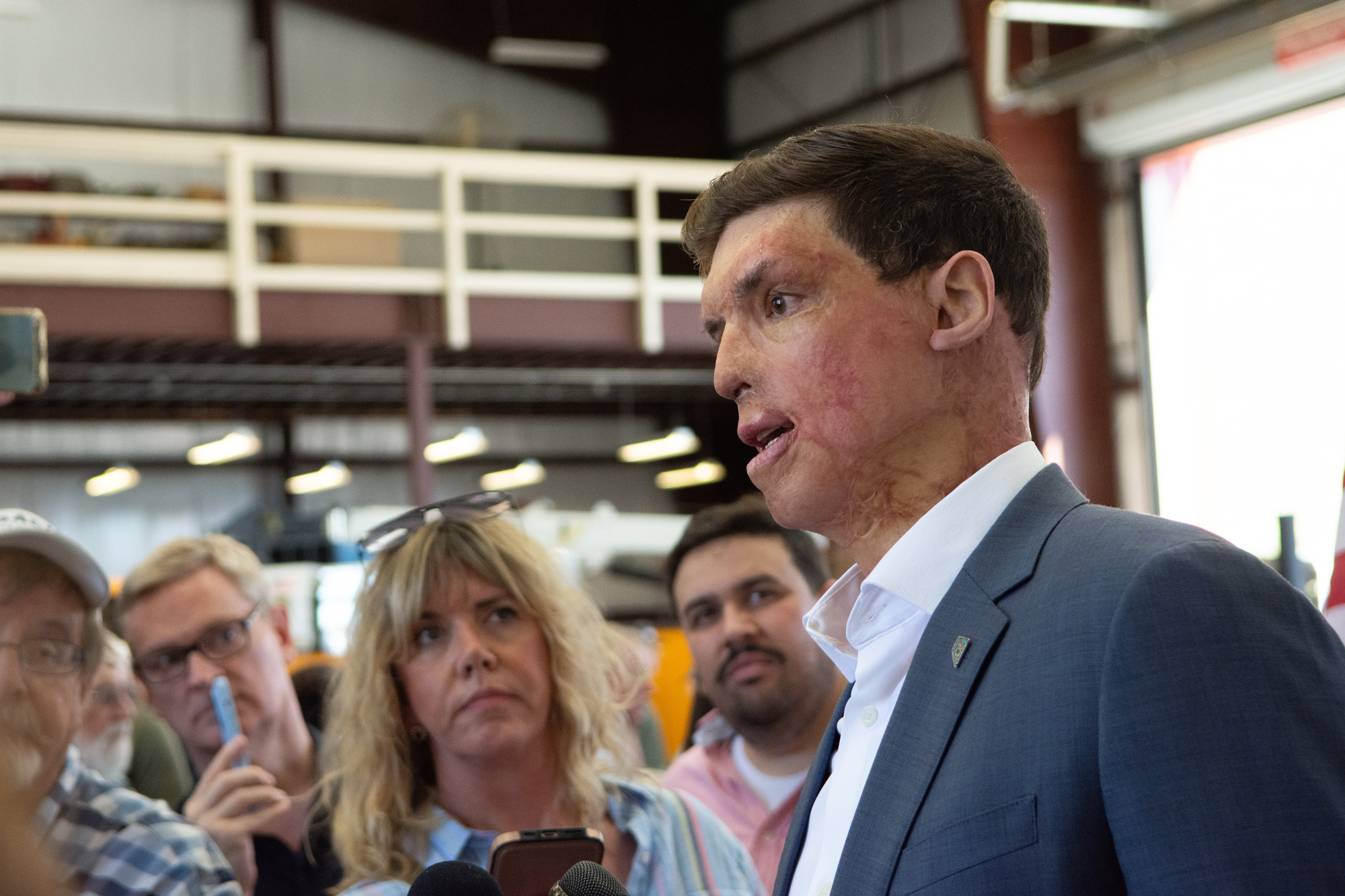In 2022, U.S. Senate candidate Sam Brown described Yucca Mountain as an “incredible loss of revenue for our state.”
After the Los Angeles Times published audio of those remarks in late April and set off a firestorm of criticism, the Republican front-runner likely to challenge Sen. Jacky Rosen (D-NV) backtracked. In a post to X on Saturday, Brown clearly expressed his opposition to the nuclear waste repository and acknowledged that the project was dead, adopting a consensus shared by most Nevada politicians and voters.
In an audio recording obtained by The Nevada Independent of a speech to supporters at a Las Vegas early vote rally that same day, Brown reiterated his opposition to the repository and explained his reasoning for changing stances between his 2022 run for Senate and now.
Brown told supporters he was first asked about Yucca in a candidate forum in 2022, saying the issue had “never been a priority of mine.”
“Not knowing a ton about the history of where it’s at, I just said I think we should always have an open mind to consider if something could be beneficial for the state,” he said. “That was kind of it.”
Brown, who moved to Nevada in 2018, said he’s since been educated on the issue.
“I’ve done a lot more research since then,” he said.
The Brown campaign confirmed that the audio recording was from a conversation he had with an activist Saturday, but declined to comment beyond his X post.
In the intervening period between his change of opinion on Yucca, Brown caught flak for the recording from Democrats and Republicans alike — underscoring Yucca’s sticking power as a campaign issue in Nevada, more than 35 years after the so-called “Screw Nevada” bill designated the Nye County site as the permanent home for the nation’s spent nuclear fuel.
AUDIO EMBED
Yucca history
From the moment Yucca Mountain was selected as the only site the Department of Energy should study for nuclear waste repository potential in 1987, Nevada leaders have fought against each successive step in the process, successfully killing the project for the moment through legislative power, legal filings and presidential appeals.
Led by former Sen. Harry Reid (D-NV), who kept any efforts to fund the project’s licensing off the Senate floor as majority leader and elicited promises from Democratic presidential candidates to let the site lie dormant, Nevada lawmakers — including Republicans such as former Sens. John Ensign (R) and Dean Heller (R) and former Govs. Kenny Guinn (R) and Brian Sandoval (R) — have rejected the repository.
In 2018, when the House of Representatives passed a bill that would resume licensing on the project, then-Senate Majority Leader Mitch McConnell (R-KY) kept it from getting a vote in the Senate to protect Heller, facing a re-election bid he would ultimately lose to Rosen.
The Nevada delegation’s five Democrats are united in their desire to see Yucca stay dead; the state’s two senators filed a bill to repeal the section of the law that originally designated the site as the country’s nuclear waste storage site. Rep. Mark Amodei (R-NV), the delegation’s lone Republican and a representative of Northern Nevada, supports further study of the project but voted against the 2018 bill to fund its continuation.
Brown’s comments
In Brown’s initial comments on Yucca in 2022, made during his insurgent U.S. Senate primary bid against eventual GOP nominee Adam Laxalt, he said he worried that another state could “steal that opportunity” if the federal government did not move forward with the repository in Nevada.
“We all know that Nevada could use another great source of revenue, and it sure would be a shame if we didn’t monopolize on that and become a central hub of new development that we can do at Yucca,” he said in the 2022 recording, which was published two years later by the L.A. Times.
After the story was published, Brown said he was “not strictly committed” to supporting the opening of Yucca, and his communications director Kristy Wilkinson told the Nevada Current in early May that Democratic efforts to call Brown out amounted to a Reid-esque “dirty political tactic of fear-mongering for votes.”.
The hits kept coming. Jeff Gunter, Brown’s biggest primary opponent, started airing an ad highlighting the Yucca comments and alleging Brown did not care about the damage radiation can do.
Democrats trotted out Rory Reid, son of former Senate majority leader and chief Yucca blocker Harry Reid, at a press conference to blast Brown’s comments. Former Sen. Richard Bryan (D-NV), the chair of the state’s commission on nuclear projects, wrote an op-ed making the case anew that any Nevada senator must stand against Yucca.
Brown ultimately said he was opposed to the project in a May 25 post to X.
“Over the past month, I’ve invested time speaking with engineers and experts on Yucca Mountain,” he wrote. “It is abundantly clear that the project is dead.”
The audio of his Saturday comments reiterate that his stance changed through “research,” as he put it, including acknowledging that the issue is more complex than Congress moving to resume progress on the site.
Several obstacles stand in the way of Yucca ever being operational — cost, a lengthy licensing process, the lack of practical shipping routes, the proximity of U.S. military installations and the prospect of litigation from the state to block any new action.
“Yucca is dead,” Brown said on the recording. “It couldn’t even be functionally opened. And I’m not going to open it.”

